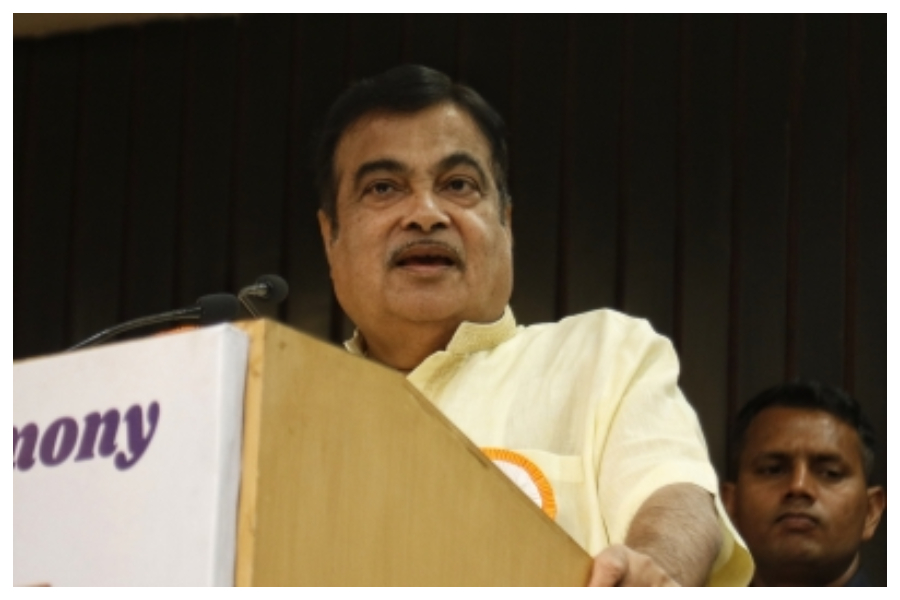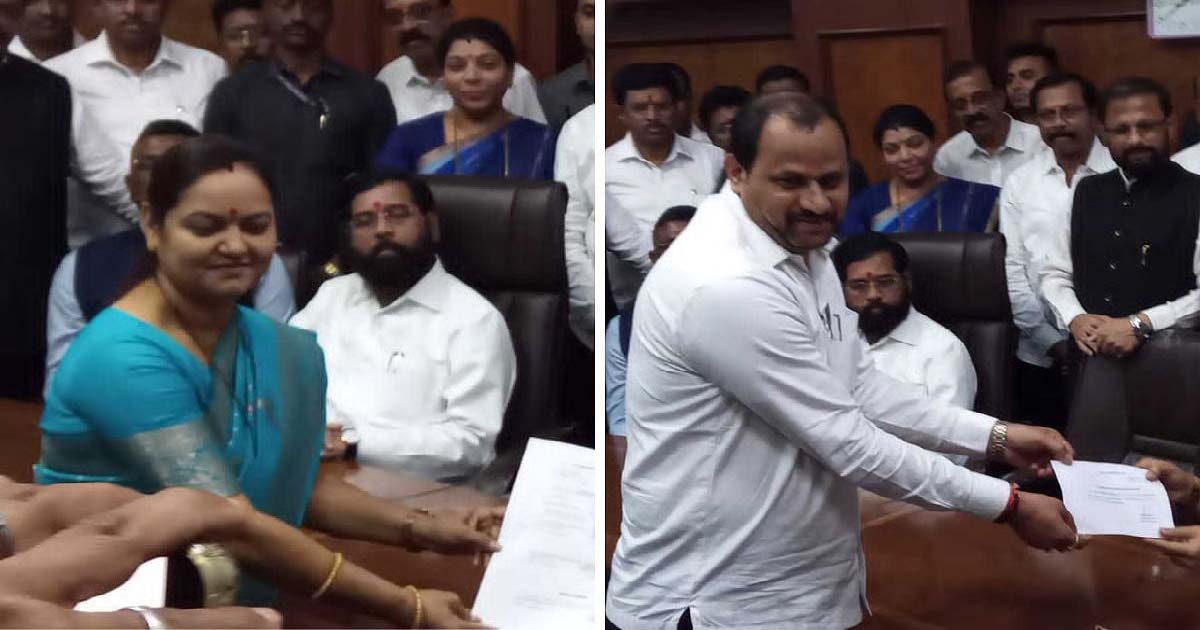Politics
Nitin Gadkari blames low-grade material for collapse of bridge in Bihar

Union Road Transport, Highways and Shipping Minister, Nitin Gadkari, on Tuesday blamed low-quality construction material for the collapse of a bridge in Bhagalpur district of Bihar.
A section of the bridge which connected Sultanganj in Bhagalpur district to Khagaria in Munger district collapsed on April 29.
The Bihar government officials submitted a report to the Union Ministry of Road Transport and Highways wherein it mentioned that the bridge had collapsed due to strong wind and fog.
“Recently, a bridge collapsed in Bihar’s Bhagalpur district. When I asked my secretary about that incident, he, on the basis of the report, said the bridge collapsed due to wind and fog,” Gadkari said while addressing people at an event in New Delhi.
“Would you believe in the theory of wind and fog? You are an IAS officer. How could a bridge collapse due to wind and fog? There must be some other reasons. The construction material used in the bridge must be sub-standard. Hence, it had collapsed,” he added during an interaction with his secretary which he shared during the event.
The construction of the bridge measuring 3.16 km in length was started on March 9, 2015, with the estimated completion time of December 2019.
The construction company has breached several deadlines and the bridge is yet to be completed.
The estimated cost of the bridge is Rs 1,710 crore and is one of the ambitious projects of Bihar Chief Minister Nitish Kumar, connecting Sultanganj in Bhagalpur district to adjoining Khagaria along the Ganga river.
The Bihar road construction department is constructing this bridge and has also prepared approach roads from both the sides.
Business
Centre’s fertiliser supplies to states scale record high of 530 lakh metric tons in April-December

New Delhi, Jan 30: Fertiliser movement from the Centre to the states on Indian Railways, during the first nine months (April-December) of the financial year 2025-26, reached an all-time high with total supplies crossing 530.16 lakh metric tons to surpass the 500 lakh metric ton mark for the first time during this period, an official statement said on Friday.
This represents a 12.2 per cent increase over the corresponding period of FY 2024–25 and is 8.5 per cent higher than the previous record of FY 2023–24, it said.
The Centre has ensured sufficient availability of all major fertilisers across states, including the supply of 350.45 lakh metric tons of urea, against a requirement of 312.40 lakh metric tons in the first nine months (April-December) of the financial year 2025-26. Similarly, in the case of major P&K (phosphorous and potassium) fertilizers including DAP, MOP & NPKS, the total supply reached 287.69 lakh metric tonnes against the requirement of 252.81 lakh metric tonnes, consistently exceeding the assessed requirement and ensuring uninterrupted availability, the statement said.
Faster and smoother movement of fertiliser rakes enabled timely supplies to states, ensuring that farmers did not face any shortages during the critical stages of cultivation. Department of Fertilisers worked in close cooperation with the Ministry of Railways and stated that such coordinated efforts have helped ensure adequate availability of fertilisers across the country, the statement added.
During this period, average rake loading on Indian Railways increased to 72 rakes per day in July 2025, rose to 78 rakes per day in August 2025 and reached 80 rakes per day in September 2025, according to the official figures.
Urea rake movement rose to 10,841 rakes, registering an 8 per cent increase over last year, while P&K fertilisers recorded 8,806 rakes, marking an 18 per cent growth. Enhanced coordination with the Ministry of Railways, ports, state governments, and fertiliser companies ensured seamless and timely supply to states during peak agricultural seasons, the statement said.
Ensuring the timely availability of fertilisers to farmers has remained one of the government’s highest priorities. In this direction, the improved coordination between the Ministry of Railways and the Department of Fertilisers during Kharif 2025 and the ongoing Rabi season was clearly visible at the ground level. The states also took concerted measures to ensure last-mile availability to farmers, the statement added.
National News
Shinde Sena’s Sharmila Pimpolkar Set To Become Thane Mayor, BJP’s Krishna Patil Deputy Mayor; Both Elected Unopposed

Thane: Sharmila Rohit Pimpolkar of the Shiv Sena (Shinde faction) is set to be appointed as the Mayor of the Thane Municipal Corporation (TMC), while Krishna Dadu Patil of the Bharatiya Janata Party (BJP) will assume charge as the Deputy Mayor. Both leaders were elected unopposed after filing their nominations on the final day for submitting nomination papers for the mayoral posts.
Pimpolkar filed her nomination for the Mayor’s post, while Patil submitted his papers for the Deputy Mayor’s position. No other candidates entered the fray for either post, clearing the way for their unopposed election. The official announcement confirming their appointments is scheduled to be made on February 3.
A meeting related to the mayoral election process was held at the Thane Municipal Corporation headquarters in the presence of Deputy Chief Minister Eknath Shinde. Several senior leaders attended the meeting, including Transport Minister Pratap Sarnaik, Thane MP Naresh Mhaske, BJP MLA Niranjan Davkhare, Ravindra Phatak and other party functionaries.
Meanwhile, reports indicated that the Shinde Sena has categorically refused the BJP’s demand to rotate the Mayor’s post for two years in Thane. In the recently concluded Thane Municipal Corporation elections, the Shinde Sena emerged as the dominant force with 75 seats, while the BJP secured 28 seats. Citing its clear numerical strength, the Shiv Sena has reportedly conveyed at the local level that it will not hand over the Mayor’s post to the BJP even for a year.
Following the refusal, BJP leaders are said to have staked claim to key power centres within the civic body, including the Standing Committee, Transport Committee, various subject committees, ward committees and the Education Board. Shinde Sena reportedly proposed that the BJP accept the Deputy Mayor’s post, while committees and ward panels could be shared between the two parties for fixed tenures of three and two years respectively.
Maharashtra
Crackdown on illegal street vendors in Andheri, Mumbai Municipal Corporation’s ‘K-Waste’ department takes action, citizens are relieved

Mumbai: Around 200 unauthorised hawkers and additional structures on footpaths in Ram Ganesh Gadkari Marg (Arla Marg) area of Andheri (West) in Mumbai were evicted by the Mumbai Municipal Corporation’s ‘K-West’ department yesterday (January 29, 2026). The operation, as per the instructions of Municipal Corporation Commissioner and Administrator Bhushan Gagrani, was conducted under the guidance of Deputy Commissioner (Zone-4) Bhagya Shri Kapse, and Assistant Commissioner (K-West Division) Chakrapani Ale. Unauthorised additional structures were found on footpaths connecting Swami Vivekananda Marg and Gulmohar Marg in Andheri (West) and on Ram Ganesh Gadkari Marg (Arla Marg) adjacent to the entrance of Dr. No. Cooper Hospital. It was also observed that unauthorised hawkers have set up shops in this area. It was creating obstacles for ambulances bringing patients to Cooper Hospital in case of emergency and for pedestrians to walk on the footpaths.
In this context, an eviction drive was launched by the ‘K-West’ administrative department of the Mumbai Municipal Corporation. Under this, around 200 unauthorized hawkers and unauthorized additional structures established on the footpaths in this area were evicted.
The eviction was carried out with the help of 04 encroachment removal vehicles, 03 JCBs and other equipment. During this operation, an adequate police force including 100 officers and employees of the Municipal Corporation were deployed. Local representatives and citizens are expressing satisfaction over this action. The Municipal Corporation administration has made it clear that regular evictions against unauthorized structures will continue in the future.
-

 Crime3 years ago
Crime3 years agoClass 10 student jumps to death in Jaipur
-

 Maharashtra1 year ago
Maharashtra1 year agoMumbai Local Train Update: Central Railway’s New Timetable Comes Into Effect; Check Full List Of Revised Timings & Stations
-

 Maharashtra1 year ago
Maharashtra1 year agoMumbai To Go Toll-Free Tonight! Maharashtra Govt Announces Complete Toll Waiver For Light Motor Vehicles At All 5 Entry Points Of City
-

 Maharashtra1 year ago
Maharashtra1 year agoFalse photo of Imtiaz Jaleel’s rally, exposing the fooling conspiracy
-

 National News1 year ago
National News1 year agoMinistry of Railways rolls out Special Drive 4.0 with focus on digitisation, cleanliness, inclusiveness and grievance redressal
-

 Maharashtra1 year ago
Maharashtra1 year agoMaharashtra Elections 2024: Mumbai Metro & BEST Services Extended Till Midnight On Voting Day
-

 National News1 year ago
National News1 year agoJ&K: 4 Jawans Killed, 28 Injured After Bus Carrying BSF Personnel For Poll Duty Falls Into Gorge In Budgam; Terrifying Visuals Surface
-

 Crime1 year ago
Crime1 year agoBaba Siddique Murder: Mumbai Police Unable To Get Lawrence Bishnoi Custody Due To Home Ministry Order, Says Report




















